
|
Astronomy Picture Of the Day (APOD)
 Maximum Sun
Maximum Sun
1.03.2001
Astronomers recently witnessed an astounding, large scale solar event as the Sun's north and south magnetic poles changed places! But, this complete solar magnetic field flip was actually anticipated. It occurs every 11 years during the maximum of the solar activity cycle.
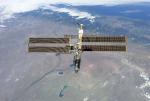 A Space Station Meets its Destiny
A Space Station Meets its Destiny
28.02.2001
The International Space Station (ISS) had a date with Destiny earlier this month. More specifically, the crew of the Space Shuttle Atlantis installed the science laboratory named Destiny on the ISS. Destiny, pictured here, will also serve as a control center for the Earth orbiting space station.
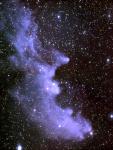 The Witch Head Nebula
The Witch Head Nebula
27.02.2001
Double, double toil and trouble; Fire burn, and cauldron bubble -- maybe Macbeth should have consulted the Witch Head Nebula. This suggestively shaped reflection nebula is associated with the bright star Rigel in the constellation Orion.
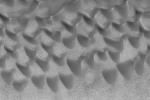 Sand Dunes on Mars
Sand Dunes on Mars
26.02.2001
Sand dunes on Mars can appear exotic. The dark dunes above might be compared to shark's teeth or chocolate confections. In reality, they arise from the complex relationship between the sandy surface and high winds on Mars.
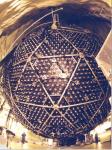 The Sudbury Neutrino Detector
The Sudbury Neutrino Detector
25.02.2001
Two thousand meters below the ground, a giant sphere has begun to detect nearly invisible particles. These particles, neutrinos, are extremely abundant in the universe but usually go right through just about everything. By stocking this 12-meter sphere with an unusual type of hea
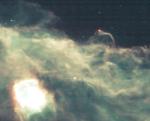 Infrared Horsehead
Infrared Horsehead
24.02.2001
This famous cosmic dust cloud was imaged in infrared light by the European Space Agency's Infrared Space Observatory (ISO) satellite. The false-color picture shows the bright infrared emission from dust and molecular gas in part of the Orion star forming region surrounding the Horsehead Nebula.
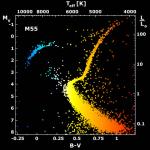 M55 Color Magnitude Diagram
M55 Color Magnitude Diagram
23.02.2001
This color "picture" of globular star cluster M55 may not look like any star cluster you've ever seen. Still, it shows a most fundamental view for students of stellar astronomy. In the picture...
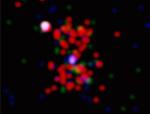 3C294: Distant X Ray Galaxy Cluster
3C294: Distant X Ray Galaxy Cluster
22.02.2001
Large clusters of galaxies are the most massive objects in the universe. Astronomers now realize that a hallmark of these cosmic behemoths are gas clouds with temperatures of tens of millions of degrees that pervade the clusters and radiate strongly in x-rays.
 A Sonic Boom
A Sonic Boom
21.02.2001
Many people have heard a sonic boom, but few have seen one. When an airplane travels at a speed faster than sound, density waves of sound emitted by the plane cannot precede the plane, and so accumulate in a cone behind the plane.
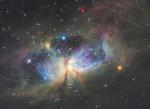 Star Forming Region S106
Star Forming Region S106
20.02.2001
Massive star IRS4 is beginning to spread its wings. Born only about 100,000 years ago, material streaming out from this newborn star has formed the nebula dubbed Sharpless 106 Nebula (S106), pictured above.
|
January February March April May June July August September October November December |
|||||||||||||||||||||||||||||||||||||||||||||||||